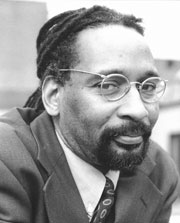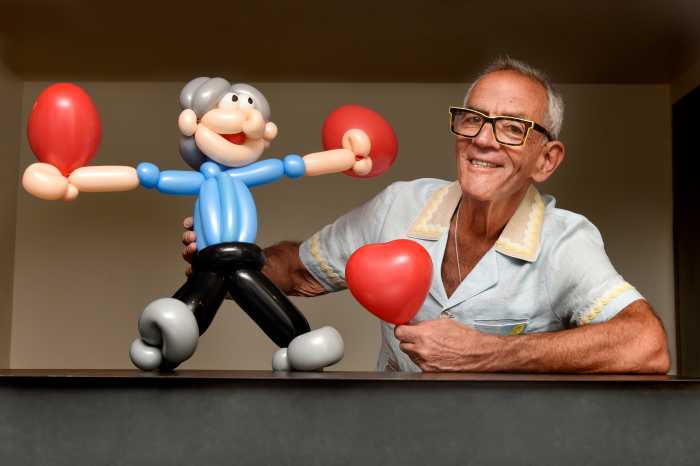By PAUL SCHINDLER
Keith Cylar, a co-founder and the co-president of Housing Works, a leading AIDS service provider in New York City, who lived with H.I.V. for more than 20 years, died in his East Village home on the evening of April 5.
According to a statement issued by Housing Works, Cylar, who was 45, suffered during the past year from cardiomyopathy, a serious enlargement of the heart, and died from a cardio arrhythmia, an irregular beating of the heart.
He was pronounced dead just before 10 p.m. Monday by E.M.S. workers summoned to his apartment by Charles King, his longtime partner. King and Cylar, along with attorney Virginia Shubert, founded Housing Works in 1992, and the two men shared responsibilities as the group’s co-presidents.
Cylar was widely admired in AIDS activist circles for his confrontational style with government officials, but also for his instinctive empathy with the everyday struggles faced by Housing Works clients, many of whom are impoverished and struggling with multiple social and medical problems.
“He was loud when others remained silent,” said Dennis deLeon, the executive director of the Latino Commission on AIDS, in a written statement. “He could shame any bureaucrat into action by any means necessary. He put his body in harm’s way on countless occasions, spending innumerable hours behind bars to try to wake people up to injustice… He consoled the families of countless friends who were clients who had lost loved ones.”
“There are few people who worked as tirelessly as Keith on behalf of the poor, L.G.B.T. people, men and women who use drugs, the homeless, the disenfranchised, people with H.I.V., people of color, and just about anybody who did not have a voice,” deLeon also wrote.
“He was one of my heroes,” said Jennifer Flynn, director of the New York City AIDS Housing Network. “I daresay he was the most important person in the AIDS housing field. If you were not doing something that would benefit homeless people with AIDS, he would sure let you know that. He was the movement’s moral barometer.”
Keith Crandell, a member of Greenwich Village’s Community Board 2, got to know Cylar well when Crandell was chairperson of the board’s Social Services Committee. Crandell said he remembers well Cylar’s “tussles with the Giuliani administration,” as well as the ferocious community opposition Housing Works faced when planning to move into its home on W. 13th St. and over its plans to build residents housing on Avenue D.
“He was black, a big man, handsome, and Charles was a white former Baptist preacher from Texas. They were just a great pair,” said Crandell. “Keith became the Washington guy. Charles was the New York guy.”
Andrew Coamey, Housing Works senior vice president, recalled there was also tremendous opposition when Housing Works was putting its needle-exchange program in place in Soho at Broadway and Houston St. All three locations, E. Ninth St., W. 13th St. and Soho, now offer needle exchange.
“I think in most cases, what we dealt with was fear and ignorance,” Coamey said of the opposition the group faced when coming into neighborhoods. “And Keith overcame that. All three communities embraced Housing Works.”
Housing Works also has a Used Books Cafe at 126 Crosby St. in Soho and four thrift shops in the city, including one in Chelsea.
Cylar, in an unpublished interview with Gay City News last September, recalled that he first became aware of AIDS soon after it was identified in 1981 while earning his bachelor’s degree in psychology at Boston University. He completed his degree at BU in 1982. Three years later, he moved to New York City to enter a social work master’s program at Columbia University, from which he graduated in 1988.
That same year, Cylar lost his first lover to AIDS, and the following year, he tested positive himself. Yet, he recalled, he happened upon ACT UP and AIDS activism somewhat by chance.
One day in 1989, while at the Lesbian, Gay, Bisexual and Transgender Community Center on W. 13th St., Cylar noticed an ACT UP literature table set up outside the first floor meeting room where the group was meeting.
“[I saw] all these guys in black leather jackets,” he said. “It was the lit that made me stop. It was the black leather jackets that pulled me into the room.”
Cylar quickly made a mark on the group, helping to found its Housing Committee.
“From that point on it all blurs for me,” he told Gay City News, a sister newspaper of The Villager, last year. “ACT UP became six days a week, seven days a week… It was 24, seven, nonstop… I became part of a community and I watched my community disintegrate… I wanted to keep people from dying. I needed to fight against this thing that was killing us and killing me.”
Housing Works battled former Mayor Rudolph Giuliani not only over public funding issues, but also about restrictions the former mayor’s administration placed on public assembly and protest. The group won several significant First Amendment victories in the courts.
King, in an interview two nights after his partner’s death, said that Cylar was “Housing Works’ principal spokesperson, especially in Washington.”
“Housing Works will his miss his vision, his energy,” he said. “We couldn’t have had a louder and more eloquent voice.”
One of the concepts that Cylar helped pioneer at Housing Works was a harm reduction approach toward helping those addicted or otherwise troubled by drug use to curb negative impacts on their lives.
“Cylar was a board member of the National Harm Reduction Coalition and helped ensure that, from the beginning, Housing Works would distinguished itself from other AIDS service organizations by not turning away anyone in need of service simply because they were still using drugs,” the writer David France said in a statement he prepared at the request of King and Housing Works.
King talked about how Cylar’s empathy for those facing problems with drugs came out of his own personal experiences with addiction, for which he sought treatment prior to founding Housing Works.
“We were partners in every way,” King said. “Keith was my biggest hero. He was an amazing fighter in the struggle and he just would never ever give up.”
Cylar was born in Virginia on April 18, 1958. In addition to King, he is survived by his parents Anna E. Patton of Cleveland, Ohio, and Marva and Harry Langester, of Portsmouth, Virginia, his great-aunt, Esther Dudley, and a score of cousins.
A funeral service was held Tues., April 13 at The Church of the Intercession, 550 W. 155th at Broadway. Following the funeral service, there was a motorcade (including buses for those without vehicles) Downtown and a procession to the Housing Works residence at Ninth St. and Avenue D for interment of Cylar’s ashes in the garden and a reception. That evening, at his request, was to follow a benefit dance party in celebration of Keith Cylar’s life at Webster Hall, 125 E. 11th St.




































